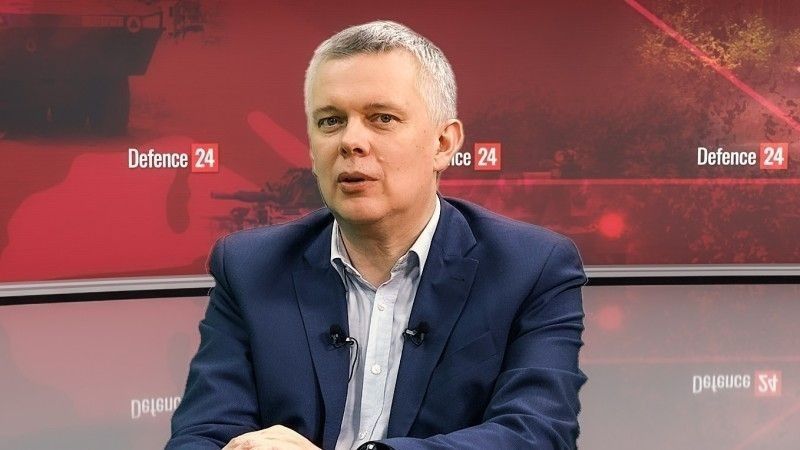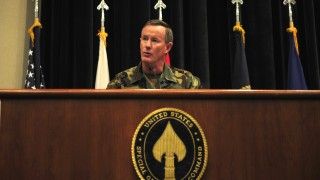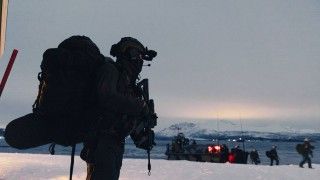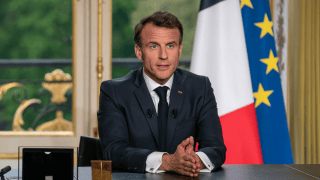- WYWIADY
- WIADOMOŚCI
Siemoniak: The Polish Industry is in Dire Situation. We Need to Establish Potential for Years [INTERVIEW]
“There was one presentation that was somewhat separate from the meeting. I do not want to be cruel to anybody, but the aforesaid presentation was a big mistake. Something like that should not be presented at the Parliament. Most probably nobody at the Ministry of Defence reviewed it, before the meeting. There were many inconsistencies, and a lack of clarity, caught by the journalists”,former head of the Polish Ministry of Defence, KO MP, and member of the Parliamentary National Defence Commission, Tomasz Siemoniak told us.

Michał Bruszewski: During the latest meeting of the Parliamentary National Defence Commission, assumptions were presented, regarding the development of the Polish Armed Forces. Procurement of the F-15 fighters was mentioned in the presentation, among other matters. How do you assess this information?
Tomasz Siemoniak, former Head of the Polish Ministry of Defence: Above all, the latest meeting of the Parliamentary National Defence Commission was devoted to the involvement of the Polish defence industry in the implementation of the plan of Armed Forces Reinforcement, compliant with our amendment added to the so-called Act on Homeland Defence. We, as the MPs, felt that this primary matter was not discussed in a satisfactory manner. There was one presentation that was somewhat separate from the meeting. I do not want to be cruel to anybody, but the aforesaid presentation was a big mistake. Something like that should not be presented at the Parliament. Most probably nobody at the Ministry of Defence reviewed it, before the meeting. There were many inconsistencies, and a lack of clarity, caught by the journalists.
All of the above stems from the fact that we are constantly navigating through a non-transparent world of conferences, announcements, and ever-changing numbers. What is said differs from what is done. We really want the public, and the Parliamentary National Defence Commission to know what is to be procured for the Polish Armed Forces. That was the idea behind our amendment, to make this transparent. What, when, for how much is procured, for defence purposes? Then we can ask about the participation of the Polish defence industry in that process. Initially these ideas were presented in a confidential manner, then unclear fragments of the plan were showcased, little pieces; never have we dealt with a comprehensive view. We do not even know how this may be tied to the technical modernization plan. It’s not about our discomfort in this effort, this is the least important matter.
In our opinion, the procurement is done in a manner that lacks transparency, completely. We either find out about these acquisitions when seeing media reports, or during the Commission meetings. Please note, that the Armed Forces are kept out of the loop too. We do not know the opinion on that matter, expressed by the Chief of the General Staff. What are his thoughts? Do the Armed Forces need main battle tanks, or should we buy jets? And when it comes to the Polish defence industry, the situation is dire. The foreign procurement made by Minister Mariusz Błaszczak, including the Korean package, is a separate story here.
The government is defending itself with the extraordinary circumstances - as we had to send our T-72 main battle tanks and Krab systems to Ukraine, we need to quickly fill in the gap and procure modern weapons available on the market - in South Korea for instance (K2 main battle tanks, K9 howitzers). And in case of the Polish defence industry, we’d need to wait. In your opinion, is the accelerated procurement, even involving foreign industries, justified by the security situation in which Poland finds itself, or by the need to fill in the gaps, as some of the equipment has been sent to Ukraine?
If an in-depth discussion on that matter happened during the meeting of the National Security Council, for instance, where the President of Poland has all tools at hand, needed to establish agreement around the matters of security, also surrounding procurement as such, we could be able to analyze arguments behind these acquisitions. In a scenario in which we find out about this by hearing the media, after the acquisition actually happens, it is difficult not to have any doubts.
Minister Czesław Mroczek was told by PiS (Law and Justice) during one of the meetings that we must be working for Putin, asking about those matters. We would be eager to get persuaded and convinced when it comes to the procurement made, had we been treated seriously. We were publicly endorsing the transfer of main battle tanks to Ukraine. We raise no strategic issue here, but the chaotic information policy is somewhat concerning.
How do you assess the manufacturing capacity of the Polish defence industry?
Who has created a situation in which the Polish defence industry cannot manufacture all of those weapons ad hoc? There were seven management boards at the PGZ Group. Why were some members of the management, who’d been appointed by PiS, arrested? Why Misiewicz was around? Why were culture animators and aquarium enthusiasts, and PiS councilmen becoming Presidents at those companies? When one drags the defence industry into such state, no wonder it cannot meet the requirements expressed by the Polish Armed Forces. We should not confuse the cause, and the effect. Nothing was done, when it comes to the Krab self-propelled howitzer, despite numerous visits involving PM Beata Szydło.
We placed our bet on Krab, cutting through the Gordian knot related to the howitzer platform. PiS did nothing here. Apart from press conferences, and attacks targeting the opponents, nothing was ever done with regard to the best product of the Polish defence industry. There was no boost of manufacturing capacity. New agreements constitute yet another set of nails in the Krab’s coffin. We will be manufacturing a different product - the K9. The “Regina” programme, essentially the Krab howitzers, was developed painstakingly, and now this programme is being shut down. This does not look good. The pressure imposed by the timeline, and by the requirements, led to a set of relevant mistakes. These are unjustifiable. This “fever” has not been caused by the war.
For 7 years we have been dealing with modernization that was described by journalists and experts as a homeopathic one. “A bit, in many years” - that’s what we heard. When the war broke out on 24th February, the authorities woke up realizing they have nothing. This is the reason for the tempo, and for the willingness to take shortcuts. Even in case of that South Korean contract, we did not get everything we could out of it. Egypt, for instance, was able to negotiate better procurement conditions. We may ask then - did we get everything that we could? Of course, there are some deficits that the Polish defence industry struggles with, but it needs to be given a chance, even at a price of postponing the deliveries by a year. Otherwise, that industry will not be able to stand up on its own, being degraded to the role of an industry that only handles overhauls of legacy equipment.
What role the Polish industry should play, in your opinion? Is its potential used to a sufficient degree?
There is no national defence without defence industry - state and private industry. Poland is too big of a country that cannot afford getting everything abroad. The Ukrainian example shows how important the domestic defence industry remains. Back in 2013 Ukraine has been ranked third, globally, in arms export. Its manufacturing potential is still very high, despite the Russian occupation of a major part of its territory, and despite the high level of threat. The matter of munitions, supply chain, overhauls, spare parts - we need to establish equipment/supply-chain gap-filling capabilities domestically. We should not look at that matter with a 1, or 2 years perspective. It is my deep belief that the current government only cares about the election. We need to be working on that with regard to a timeline of 10-15 years.
The threat may emerge on a timeline as such. It would not happen in two weeks. This is not really plausible. It is far more difficult to think simultaneously about what happens tomorrow, and in ten years. This is true. But adoption of a stance as such is necessary. The defence industry was consolidated by us back in 2014. Together with PM Donald Tusk, and Włodzimierz Karpiński, the Minister of Treasury, we came to a conclusion that the industry should take on a form of one, strong company that would also be acting in the capacity of a technological and offset partner for the Polish Armed Forces, other states, or within the framework of European programmes. The first decision made by the new government was to subordinate the PGZ Group to the Minister of Defence. It was made immediately. And then we had a festival of arrests, Misiewicz-gate, and several changes of management. Some Presidents of the Group worked there just for 1 month - what’s the point of even having a conversation on that matter here?
What would you expect from the Polish Ministry of Defence?
Minister Błaszczak has brought the Technical Modernization Council to life, indeed, but we do not really know what they are working on, and what the results of their efforts are. Everything is in the legislation, and a myriad of documents. The General Staff, along with the Armed Forces - the equipment user - shall be the opinion source, on what’s needed, and what the requirements are, what requirements we have, in the light of the emerging threats. The Polish Ministry of Defence should accept this in a form of the Technical Modernization Plan, where everything should be put on a timeline, and there the involvement of the Polish defence industry should begin, as it usually happens. There is a requirement to consult that.
And the practical side of things? First, an announcement is made on procurement of the F-35, then that acquisition becomes a part of the plan, and only after that the decision is a subject of consultation, happening at the Committee meeting - everything has been reversed. The National Security Council is a serious, constitutional body. This is not the place to discuss details, but the general matters should be brought up there. I absolutely can imagine a meeting of the NSC happening, when it comes to the Korean package. This is confidential, so an opportunity would present itself, to engage in a normal conversation. The Ministers would outline the reasoning of theirs. Meanwhile, during the meetings of the Committee we get to hear people quoting John Paul II, and Cardinal Stefan Wyszyński. No comment here is needed.
Thank you for this conversation.















